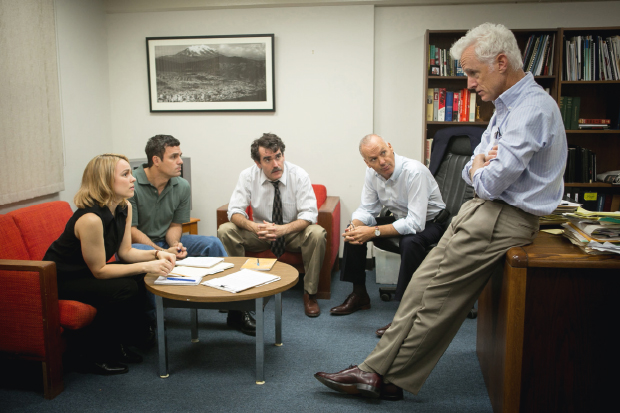A Worthy Film That Just Doesn't Fly: Spotlight Reviewed
By Deborah Ross
Like The Revenant and The Big Short, Spotlight is yet another Oscar contender ‘based on true events’ — although it has now been suggested that The Revenant was 99.7 per cent made up. (Does this matter? Only, I suppose, in the sense that you should know what you’re watching.) But we’re on firm ground with Spotlight, where the events — the Boston Globe’s uncovering of systemic child abuse by Catholic priests in Massachusetts — are a matter of record, although how you make a film about something so awful, I don’t know. Personally, I wanted the film to give it to the Church with both barrels, and let rip with fury, but it’s too restrained for that. Instead, what we have is conscientiously dogged, as well as somewhat repetitive, driving the same points home over and over. Indeed, if I’d had ?1 for every time the script employed the phrase ‘But this is the Church we’re talking about!’, it would have been an odd way to make money, but I’d have come away quite well off all the same. Directed by Tom McCarthy (The Station Agent, The Visitor), who also co-wrote the script with Josh Singer (The Fifth Estate), the film is set in 2002, in Boston, a city which, you quickly gather, is so Catholic — ‘But this is the Church we’re talking about! — that no one wants to acknowledge what is happening right under their noses, and this includes the Globe. (Think BBC at the time of Savile, and that’s where it was at, more or less.) The Globe had evidence of abuse going back many years, but either buried stories or failed to act on leads, and that was its modus operandi until the arrival of a new editor, Marty Baron (Liev Schreiber). Baron is not a Bostonian. He’s Jewish. He’s an outsider, unclubbable, immune to winks on the golf course and to certain looks over drinks and such like. He insists the Globe does some digging, and puts the paper’s ‘Spotlight’ investigative team on it. The team are disbelieving at first. ‘But this is the Church we’re talking about!’ And so on, until my pockets all but jangled. The team, as led by Robby Robinson (Michael Keaton), has three reporters at its disposal: Mike Rezendes (Mark Ruffalo), Sacha Pfeiffer (Rachel McAdams) and Matt Carroll (Brian d’Arcy James). Here the film is, I think, caught between a rock and a hard place. Give the reporters too much personality or back story and it becomes self-aggrandising — about them, not the victims — but award them too little, and they are phenomenally dull and bland, as is the case here. Rachel McAdams, who, as a rule, is mesmerisingly ace, could have been played by a lamppost, for all she brings to the party, or is asked to bring to the party. Still, the team start digging, interviewing victims, knocking on doors, poring over parish directories and old newspaper cuttings. (This was a time when the internet was in its infancy, and journalists had to do real work; makes me tired just thinking about it.) Slowly, it dawns on them. This isn’t about ‘a few bad apples’. This isn’t about one priest, moved around several times. This is about many paedophile priests, and a cover-up that extends to the Archbishop of Boston, Cardinal Law (Len Cariou), who was aware of the problem, and ignored it. Spotlight’s richest source of information, I should add, is a lawyer (as played by a worryingly gaunt Stanley Tucci), who is bringing multiple actions on behalf of individual victims, and who leads Rezendes to crucial ‘sealed documents’. This bit was complicated, involved much exposition, and I’m hoping you have to be somewhat au fait with the American legal system to understand it as, frustratingly, I did not. There is the occasional good scene, as when a particular priest is doorstepped, and uses the most astonishing reasoning to get himself off the hook, but mostly it plods along without any sense of suspense or pace or excitement — it’s not All the President’s Men, just in case you were wondering — while failing to capture the newsroom, as so often happens in films about journalism. Why for example, is the Globe deserted on a Sunday, when it’s a daily newspaper? Who’s working on the Monday edition? And if you’re not going to let your reporters swear (for certification reasons, presumably), do you really need to keep having them say ‘jeez’ and ‘freaking’ instead — as in: ‘Jeez, this is the freaking Church we’re talking about’? It may be that the film’s desire to do the subject justice leads to its shortcomings. Its respectful distance makes it all feel rather impersonal. We don’t properly meet a single priest, or victim. We don’t ever properly understand the human cost as we did with, say, Philomena. Plus, its determination not to sensationalise means it doesn’t, for example, indulge our longing to see the smile wiped off the Cardinal’s face at the end, even though that was my greatest wish. This is a worthy film on an important subject, but it just does not fly.
|
.
Any original material on these pages is copyright © BishopAccountability.org 2004. Reproduce freely with attribution.
